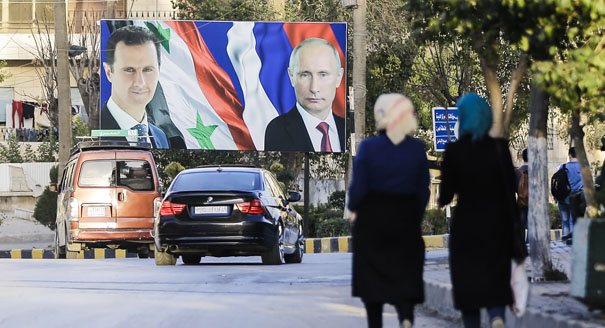Karim Emile Bitar | Associate professor of international relations at Université Saint-Joseph in Beirut and senior fellow at the French Institute for International and Strategic Relations
Russia certainly has a significant number of highly qualified Arabic-speaking diplomats and Middle East experts with in-depth knowledge of the Syrian dossier. However, after President Vladimir Putin’s unflinching support for the Assad regime in the past few years, his heavy-handed military intervention in Syria, and his repeated use of the veto at the United Nations Security Council, it is hard to see how Russia could be an independent mediator given the intense polarization among Syrian parties. In the eyes of Assad’s adversaries, Putin’s Russia being an honest broker in Syria today makes no more sense than the U.S. being an honest broker on the Israeli-Palestinian dossier.
The Geneva process, will all its flaws, remains the only legitimate track from the perspective of international law. The Sochi conference would therefore most probably fall short of achieving an inclusive and genuine national reconciliation. Rather, it aims at undermining the UN and at bolstering Assad’s stand and legitimacy by giving the impression that he’s negotiating with his real opposition, whereas most groups willing to be represented in Sochi are part of a tolerated or “domesticated” opposition.
Notwithstanding the talent of its diplomats, as long as Russia’s support of Assad is perceived as being unconditional, the hardliners within Syria’s opposition will argue that Putin is trying to be judge, jury, and executioner.
Sarah Leah Whitson | Executive director of the Middle East and North Africa division at Human Rights Watch
The Sochi talks may be off for now, tied up in the political knots of the conflict’s many proxy battles. But if Russia is serious about seeking a successful political peace process, it needs to get serious about addressing the fundamental issues keeping Syria divided. There may well be merit in its efforts to seek a breakthrough in dialogue given the failed efforts in Geneva, but Russia will not be able to make this “peoples’ congress” credible without gaining the trust of the Syrian people.
To do that, it is critical for Russia to squarely make commitments to end the ongoing unlawful airstrikes against civilians and aid blockades; address the fate of thousands of detainees—some missing for years; ensure some modicum of accountability, at the very least through a domestic truth-telling process; and guarantee an equitable plan for national reconstruction. Russia should also ensure that its allies, Syria and Iran, do not seek to undermine these efforts. Otherwise, there will be little progress, and discussions about a new constitution and a reform process will end up as empty as previous talks.
Dmitri Trenin | Director of the Carnegie Moscow Center
The recent postponement of the meeting in Sochi of Syrian opposition groups is a fresh testimony of the difficulties lying on the path of post-conflict reconciliation in Syria. Over the past five-plus years of the war, there have been many more setbacks than successes in making the parties to the conflict talk to, and not just shoot at, each other. Yet, with the war evidently drawing to a close, some kind of a settlement, de jure or de facto, is in sight. Diplomacy, like war, becomes more intense the closer one gets to the final outcome.
From the very start, Russia has been waging both war and peace simultaneously in Syria. It supported the government in Damascus with military force, while keeping channels of communication open to the opposition groups. It understood from the beginning that the Syria ruled single-handedly by the House of Assad became history in 2011, and it reached out exactly to those whom it opposed on the battlefield, literally bombing them to the negotiating table.
Russia’s goal is a unified Syrian state, but one carefully and securely balanced internally among the various unequal stakeholders. That goal is notoriously hard to achieve, because it requires consent among the major regional players, from Turkey to Iran to Saudi Arabia. Yet, Moscow keeps trying. And, after suffering many more setbacks along the way, it might one day reach its desired outcome.
Paul Salem | Senior vice president for policy research and programs at the Middle East Institute in Washington, D.C.
War is the continuation of politics by other means; in the Syrian context, the reverse is also true. Now that the Assad regime and its allies feel that they have secured basic victory in the Syrian war, the Russians are keen to translate that battlefield dominance into a political “settlement” that legitimizes Bashar al-Assad’s rule in exchange for minor and cosmetic concessions to the opposition.
While Syria does need a genuine “Syrian national congress” to renegotiate the Syrian national pact, none of that is on offer. The Assad regime since the 1970s has not been built on inclusion, consent, and power-sharing, and it is not about to start now. While some have attempted to learn lessons from how neighboring Lebanon ended its long civil war, and regardless of the merits of the case, Sochi will not lead to anything like a Syrian Taif agreement. Lebanon’s government had been based on the principle of power-sharing for decades, and the negotiations at Taif were a genuine attempt by all parties to agree on new arrangements of power. What the Russians and Assad are looking for is a political fig leaf.
Even if the Assad regime and its allies have achieved de facto dominance for the immediate future, a real political settlement in Syria is nowhere in view.








